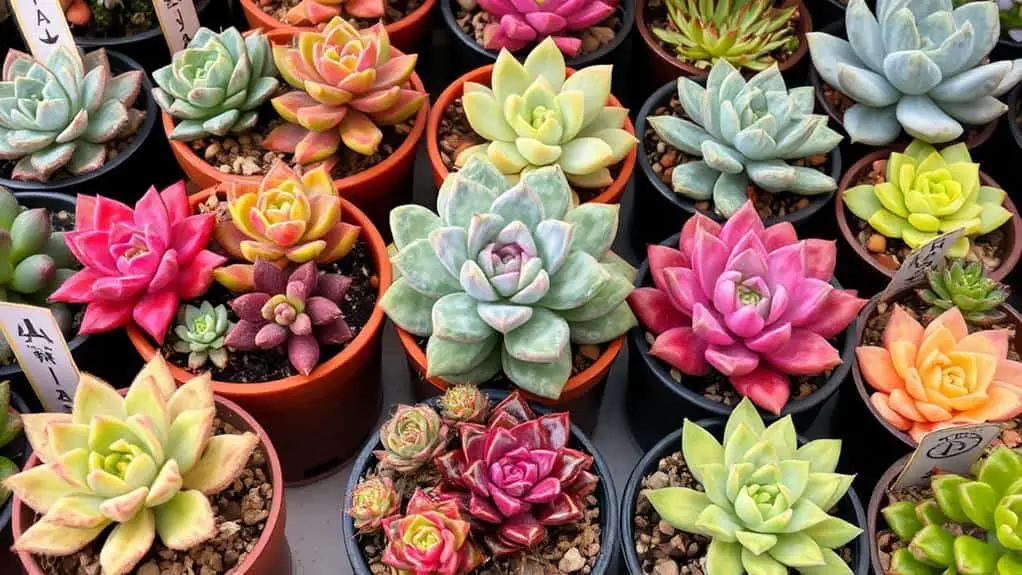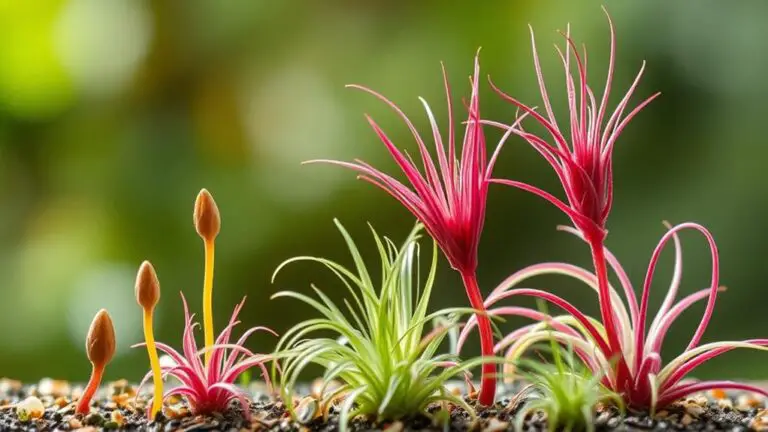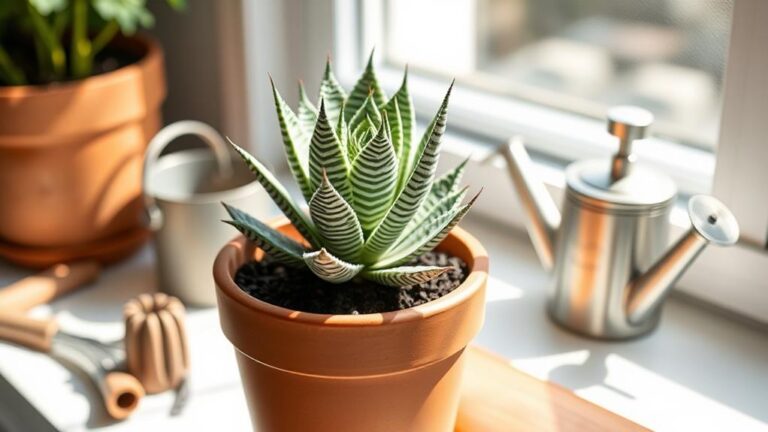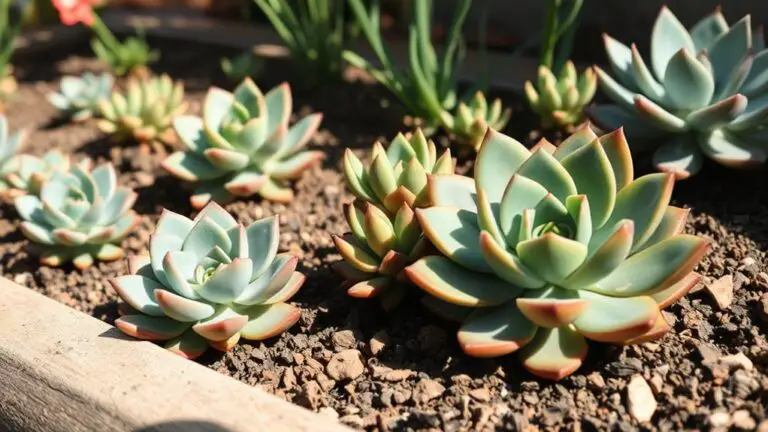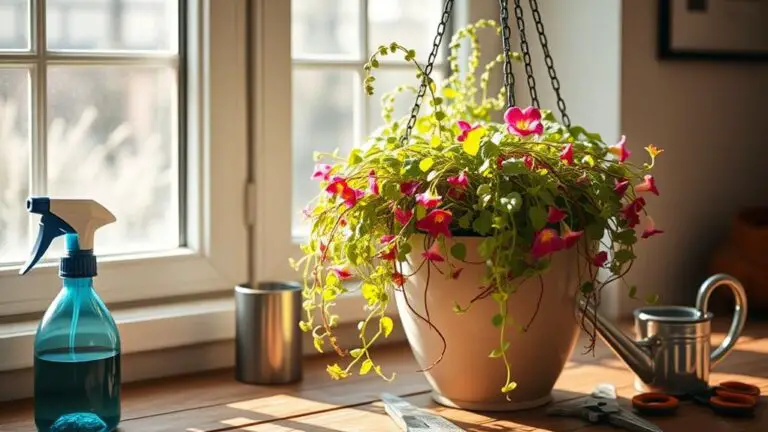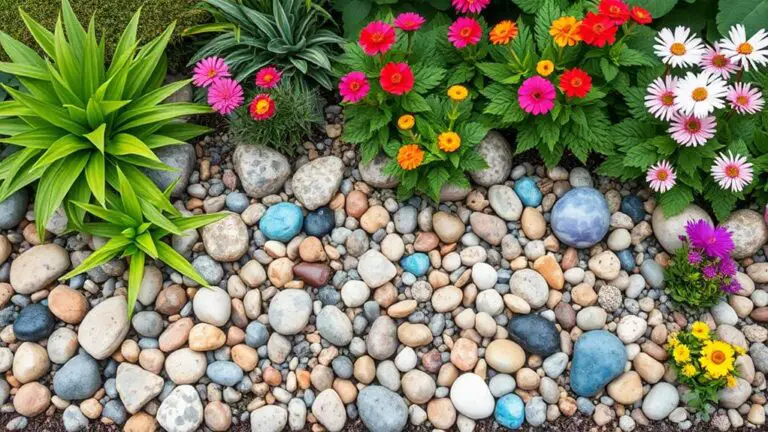Are Succulents Poisonous?
When you bring succulents into your home, you might wonder if they're safe for your pets. While many succulents are harmless, some like Aloe Vera, Kalanchoe, and Euphorbia can be toxic if ingested by your furry friends. These plants contain compounds that may lead to gastrointestinal issues and other serious symptoms. On the flip side, there are pet-friendly options such as Hens and Chickens, Haworthia, and Echeveria. It's important to be aware of which succulents can pose a risk. So, how do you guarantee a safe environment for your pets?
Toxic Succulents for Pets
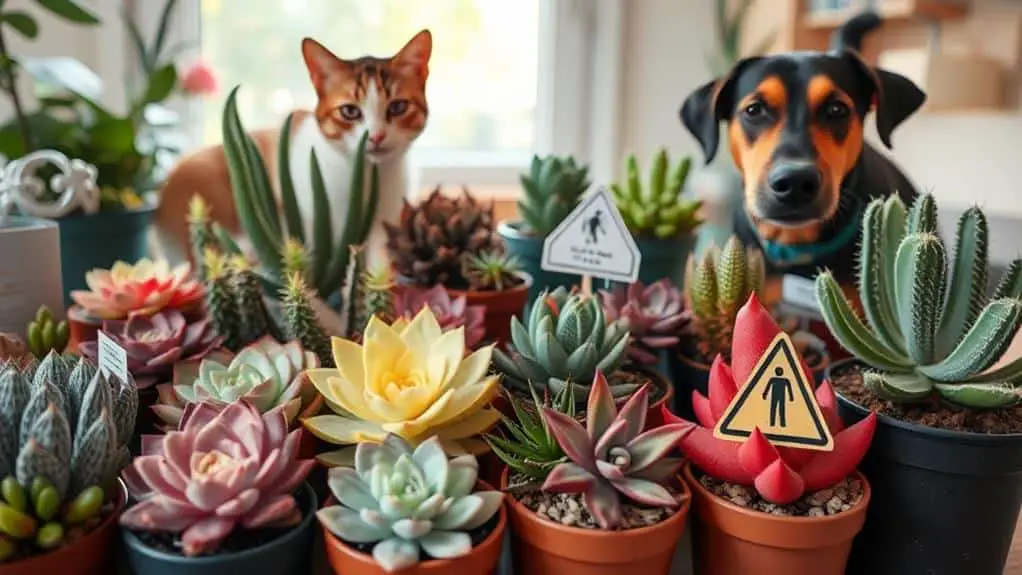
For pet owners, it's crucial to know that many common succulents, like Aloe Vera and Kalanchoe, are toxic to animals. If your pet ingests these toxic succulents, they can experience symptoms such as vomiting, diarrhea, and lethargy. To prevent this, keep these plants out of reach.
Kalanchoe species, especially Kalanchoe tomentosa and Kalanchoe daigremontiana, contain cardiac glycosides. These substances can lead to severe heart arrhythmias in pets, which is very dangerous.
Another plant to watch out for is the Euphorbia plant. Varieties like the Pencil Cactus and Crown of Thorns produce a milky sap that can cause gastrointestinal upset and skin or eye irritation.
Jade plants, known scientifically as Crassula ovata, are also mildly toxic to pets. If consumed, they can cause gastrointestinal upset, incoordination, and lethargy.
It's important to keep these plants out of reach of both children and pets to avoid any accidental ingestion.
While some succulents are safe, always research and monitor houseplants for potential toxicity. Understanding which plants are harmful helps you create a safer environment for your furry friends.
Stay vigilant and maintain your home as a safe haven for everyone in it.
Aloe Vera Dangers
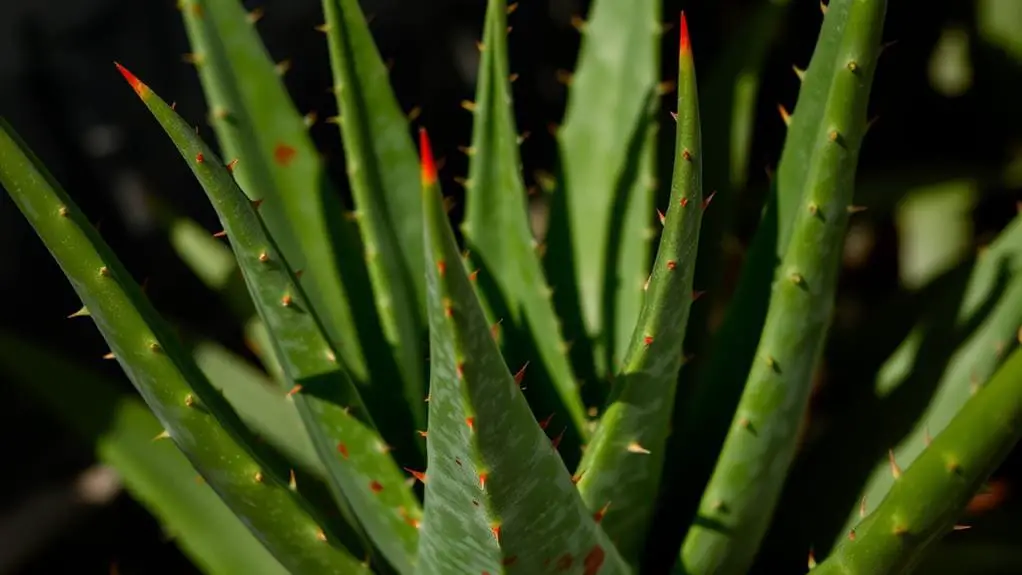
When considering houseplants, it's important to be aware of the dangers that aloe vera poses to pets. Aloe vera contains saponins and anthraquinones, which are toxic to pets. If they ingest the plant, it can cause gastrointestinal distress, leading to symptoms like vomiting and diarrhea. In large quantities, it can even cause lethargy and tremors. So, it's vital to keep aloe vera out of reach of your furry friends.
Although aloe vera is known for its medicinal benefits for humans, it's harmful to pets. If your pet does ingest it, seeking veterinary care is necessary. The toxic compounds require professional treatment to prevent serious effects.
When handling aloe vera, be cautious. The sap can cause skin irritation in humans, making it important to wash your hands afterward. Additionally, make sure that children don't touch the plant to avoid any potential issues.
| Aloe Vera Dangers | Symptoms in Pets | Safety Tips |
|---|---|---|
| Toxic Compounds | Vomiting, Diarrhea | Keep out of reach |
| Large Quantity Ingestion | Lethargy, Tremors | Seek veterinary care |
| Handling Sap | Skin Irritation | Wash hands after |
| Children's Safety | Potential Issues | Supervise interactions |
Kalanchoe Risks
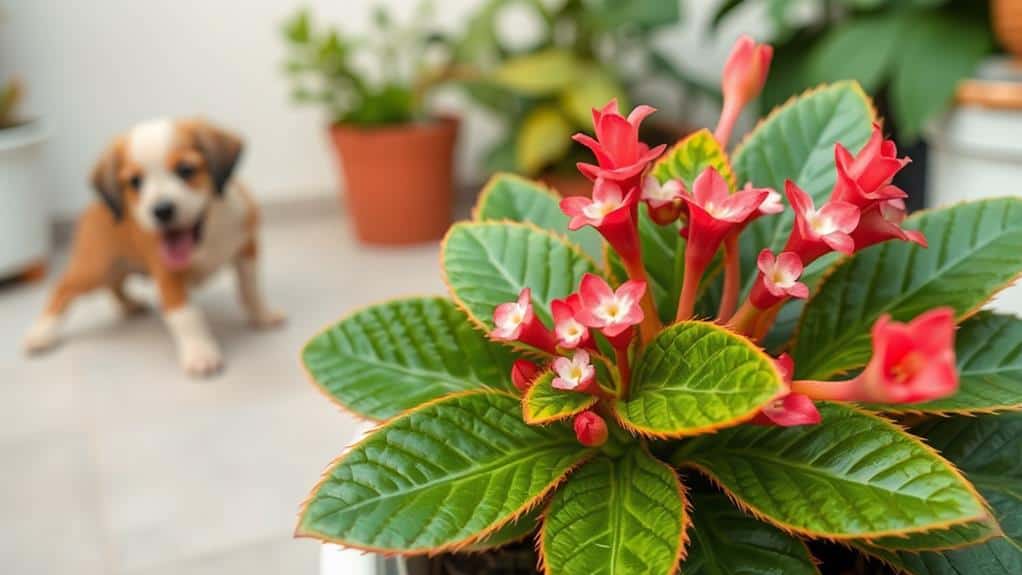
Kalanchoe plants, while attractive and popular as houseplants, pose significant risks to pets due to their toxic compounds. If your pet ingests Kalanchoe species like Kalanchoe tomentosa or Kalanchoe daigremontiana, they could experience severe gastrointestinal distress and even heart arrhythmias.
These plants contain cardiac glycosides, specifically bufadienolides, which are toxic to pets. Symptoms of Kalanchoe poisoning in pets include vomiting, diarrhea, drooling, and abdominal pain. These symptoms appear quickly and require immediate veterinary assistance. It's essential to act fast to prevent further complications.
While Kalanchoe may cause only mild gastrointestinal upset in humans, it poses a much greater risk to animals. As a pet owner, you should keep these plants out of reach to guarantee the safety of your pets.
Consider placing them in areas your pets can't access or opting for pet-friendly alternatives. Being proactive about plant placement can prevent unnecessary distress and costly vet visits.
Euphorbia Hazards
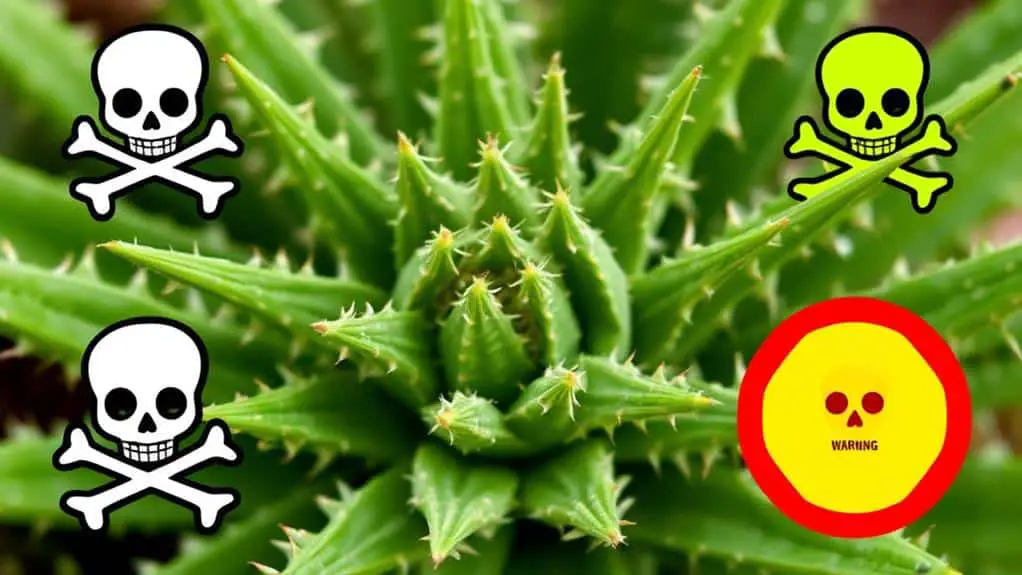
When you're handling Euphorbia plants, you need to be extra careful because they can be quite harmful.
These plants secrete a milky sap that can irritate your skin and eyes, and if pets or children ingest any part of the plant, it can cause serious stomach issues.
Always wear gloves to protect yourself and keep these plants out of reach to guarantee everyone's safety.
Skin and Eye Irritation
Euphorbia plants are notorious for their hazardous sap, a milky latex-like substance that can wreak havoc on your skin and eyes. When you handle Euphorbia without gloves, the sap can cause skin irritation, leading to a rash, redness, and even swelling.
It's important to be cautious and wear gloves to avoid direct contact. Here's what you should watch out for:
- Skin irritation: The milky sap can cause burning sensations and rashes.
- Eye irritation: If the sap gets in your eyes, it can cause significant redness and pain.
- Toxicity: This sap is highly toxic, leading to potential gastrointestinal distress if ingested.
- Handling precautions: Always use gloves to prevent sap exposure when dealing with Euphorbia.
Even though the sap is dangerous, you can still enjoy these plants safely by taking a few simple precautions.
If you do get sap on your skin or in your eyes, wash the area immediately with water. Being mindful of these hazards helps you protect yourself and your pets from any harmful effects.
Toxicity in Pets
Handling Euphorbia plants comes with a serious risk when you have pets at home. These succulents are poisonous and can cause severe problems.
The milky sap from Euphorbia, including common varieties like Pencil Cactus and Crown of Thorns, is highly toxic to pets. If your pet ingests this sap, they might suffer from gastrointestinal distress, including symptoms like vomiting and diarrhea.
The sap can also cause skin irritation if it touches your pet's skin. Worse, it can lead to eye irritation too. If your pet shows symptoms like lethargy and dehydration, it's crucial to seek immediate veterinary care.
To keep your pets safe, always keep Euphorbia plants out of reach. Educate yourself about the specific species you have at home so you can prevent accidental exposure.
Safe Succulents for Pets
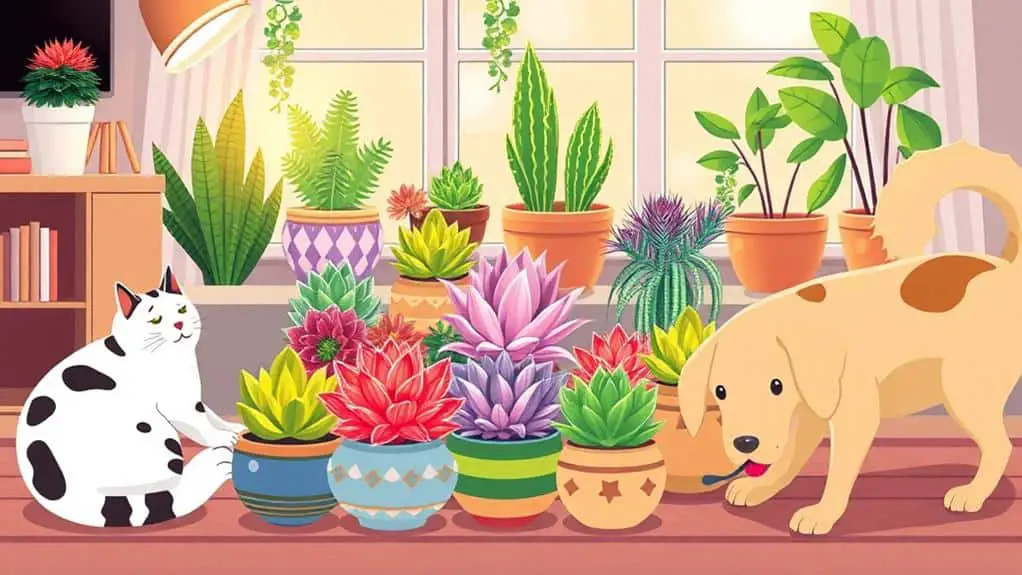
If you're a pet owner looking to add some greenery to your home, it's important to choose plants that won't harm your furry friends.
Luckily, there are safe succulents for pets that not only brighten up your space but also pose no serious risk to your animals. These pet-friendly succulents are non-toxic to pets and require low maintenance, making them a great choice for any home.
Consider these popular succulent varieties:
- Hens and Chickens (houseleek): Safe for animals, this succulent is easy to care for and won't cause harm if ingested.
- Haworthia (zebra cactus): Resembling aloe, this succulent is non-toxic to pets and a perfect addition to any pet-friendly home.
- Burro's Tail: Known for its lush, trailing tendrils, this succulent is safe for pets and poses no toxicity risk.
- Echeveria: Another pet-friendly option, it's both attractive and non-toxic to pets.
While these succulents are generally safe, it's vital to research specific succulent types.
Even non-toxic plants can cause mild gastrointestinal upset if consumed in large amounts. Always make sure your pet doesn't overindulge in these otherwise safe succulents.
Protecting Your Pets
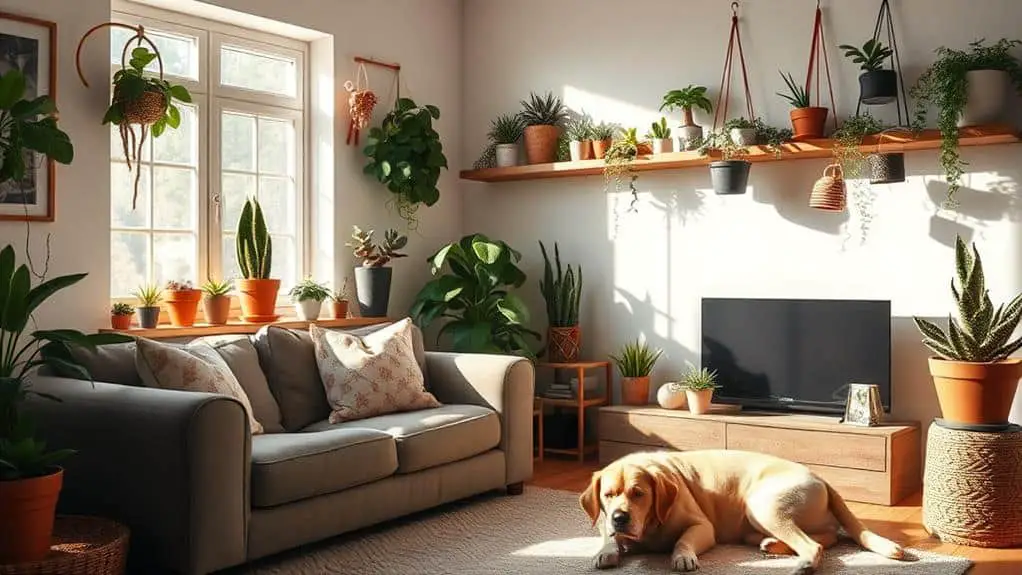
Ensuring your pets stay safe around succulents requires vigilance and informed choices. Some succulents, like Aloe vera and Kalanchoe, are toxic to pets. If ingested, these plants can cause gastrointestinal upset, including vomiting, diarrhea, and lethargy.
To prevent accidental ingestion, keep all succulents out of reach of your pets.
Regularly monitor your pets' behavior around houseplants. It's important to know which succulent varieties are safe and which are harmful. Non-toxic options, such as Hens and Chickens or Haworthia, are great choices if you want to minimize risks. These plants are safe for pets and can add beauty to your home without the worry of poisoning.
If you suspect your pet has ingested a toxic succulent, seek immediate veterinary assistance. Time is essential in addressing potential health risks.
Be proactive in educating yourself on plant safety and always keep an eye on your pets.
Frequently Asked Questions
Can Succulents Be Poisonous to Humans?
Yes, some succulents can be poisonous to humans. Watch out for Euphorbias, Kalanchoes, Aloe Vera, and Anthuriums. They can cause skin irritation, gastrointestinal issues, or more severe symptoms if ingested in large amounts.
Are Succulents Poisonous to Pets?
Some succulents, like Aloe vera and Jade plants, are toxic to pets. They can cause vomiting, diarrhea, and more. Always research specific plants to verify they're safe. Opt for non-toxic alternatives like Hens and Chickens or Haworthia.
Which Succulents Are Toxic to Children?
Some succulents toxic to children include Aloe vera, Kalanchoe, and Jade plants. Euphorbia's sap can irritate skin. Always educate your kids about not ingesting unknown plants and supervise their interactions with succulents for safety.
Why Shouldn't You Touch Succulents?
You shouldn't touch succulents because some can cause skin irritation, allergic reactions, or painful cuts due to their toxic sap or sharp spines. Always wear gloves and wash your hands thoroughly after handling them.
Conclusion
You don't need to worry too much about your succulents if you do a bit of research. By choosing pet-safe plants like Hens and Chickens, Haworthia, and Echeveria, you can create a beautiful, pet-friendly garden. Keep an eye on your pets and make sure they stay away from toxic plants like Aloe Vera and Kalanchoe. With a little effort, you can have a thriving succulent collection and happy, healthy pets. Happy gardening!

